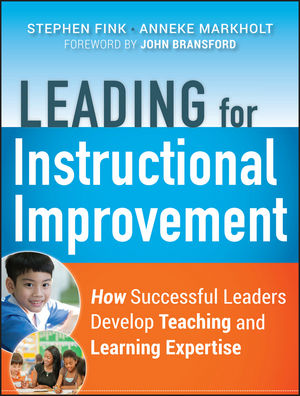Leading for Instructional Improvement: How Successful Leaders Develop Teaching and Learning ExpertiseISBN: 978-0-470-54275-0
Paperback
304 pages
March 2011, Jossey-Bass
 |
||||||
Foreword ix
Acknowledgments xiii
Introduction xvii
The Authors xxvii
About the Center for Educational Leadership xxix
Part One Making the Case for Instructional Expertise 1
One The Leader’s Role in Developing Teacher Expertise 3
It Takes Expertise to Make Expertise 5
Building Shared Understanding 16
Conclusion 19
Discussion Questions 20
Part Two Developing an Expert Instructional Eye 21
Two The Five Dimensions of Teaching and Learning 23
Purpose 26
Student Engagement 29
Curriculum and Pedagogy 34
Assessment for Student Learning 37
Classroom Environment and Culture 41
Conclusion 46
Discussion Questions 46
Three Applying the Five Dimensions of Teaching and Learning 47
Analysis 52
Conclusion 84
Discussion Questions 84
Part Three Leading for Instructional Improvement 85
Four Observing Classroom Practice 87
Leadership Begins with Purpose 87
The Learning Walkthrough 89
The Goal-Setting and Implementation Walkthrough 106
The Supervisory Walkthrough 114
Conclusion 121
Discussion Question 122
Five Responding to Observations 123
Observations, Interpretations, and Feedback 125
Classroom Observations and Honest Conversations 129
The Development of Shared Vision: A District Case 134
Organizing Thinking: A Middle School Case 142
Conclusion 146
Discussion Questions 147
Six Orchestrating Professional Learning 149
Leaders as Conductors 151
Orchestrating Professional Learning 173
Conclusion 186
Discussion Questions 187
Seven Coaching to Improve Practice 189
What is Coaching? 190
Why Does Coaching Matter? 191
Modes of Coaching 192
Peer Coaching and Mentoring 193
Cognitive Coaching 194
Instructional Coaching and Content Coaching 197
Expertise in Content Coaching 199
Research-Decide-Coach 205
Conclusion 217
Discussion Questions 217
Part Four Embracing New Opportunities for Leading and Learning 219
Eight The Leader’s Role in Improving Teacher Practice 221
Reciprocal Accountability 221
Leading with an Inquiry Stance 230
Conclusion 240
Discussion Questions 240
Nine A New Vision for Improving Learning for All 241
Discussion Questions 246
Appendix A: 5D Framework 247
Appendix B: Types of Classroom Observations 253
References 257
Index 263



